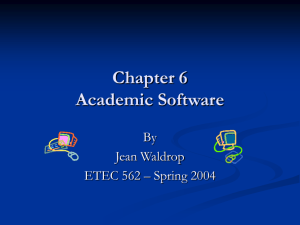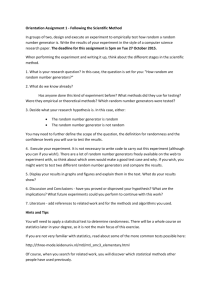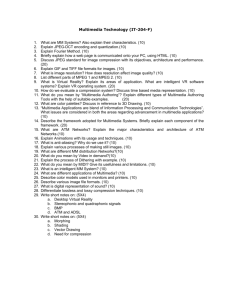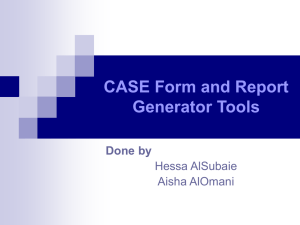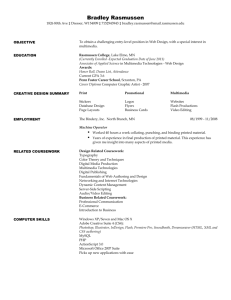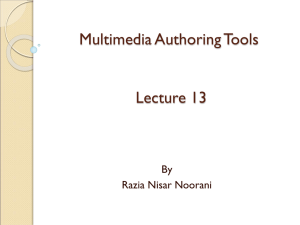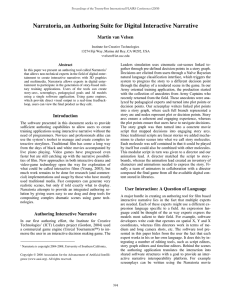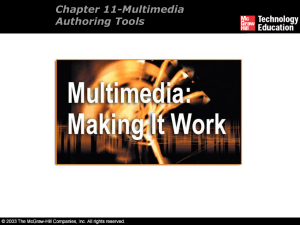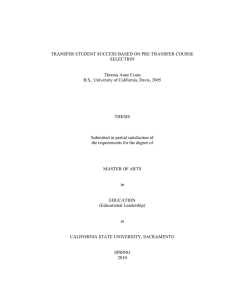Chapter 5 - Productivity & Other Software Tools
advertisement
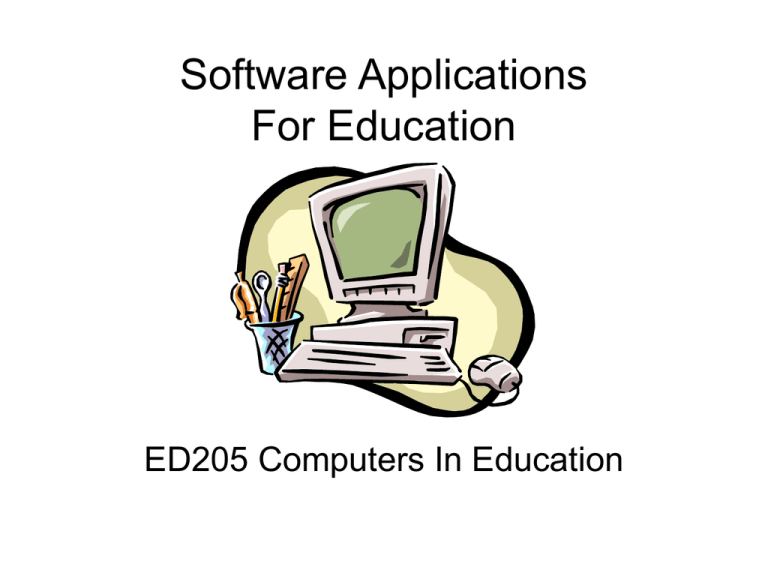
Software Applications For Education ED205 Computers In Education The Role of the Operating System • Software can be categorized as System Software or Application Software. • System Software consists of programs that control the operations of the computer and it’s devices. • There are two main systems: Windows & Mac OS • System Software is the “Interface” between you, your application, and your computer’s hardware. • Each time you start your computer, the system software is loaded into the computers memory The Role of the User Interface • The User Interface controls how you enter data or instructions or how information is presented on the screen. • The most common interface today is the Graphic User Interface or “GUI” • The GUI was introduced by Apple Computers in 1984 Application Software • Application Software consists of programs designed to do specific tasks. • An application can be used for the following purposes: – – – – – As a productivity/professional tool Support for school and professional activities Assisting with graphics and multimedia projects Helping with home and personal activities Facilitating communications (email, Internet, etc) Types of Software Support Tools • Productivity tools to explore in ED-205 – Word Processing (MS-Word) – Spreadsheets (MS-Excel) – Presentation Software (MS-PowerPoint) – Multimedia Authoring ( PowerPoint & HyperStudio) – Imaging Software (iPhoto) – Graphical Organizers (Inspiration) – Video Editing Software Other Types of Software Support Tools • • • • • • Materials Generators Data Collection & Analysis Tools Graphics Tools Planning & Organizing Tools Research & Reference Tools Specific Content Area Tools – CAD/3-D Modeling – Music Synthesizers – Scientific equipment – Reading Tools • The two websites below offer many tools for the classroom teacher www.edhelper.com www.teachernet.com More Tools For The Classroom • • • • • • • Test Generators Worksheet Generators Puzzle Generators Bar Code Generators Certificate Makers Form Makers Gradebooks Word Processing • Advantages – Time Savings – Better Appearance – Sharing • Issues – – – – – When to introduce Word Processing Necessity of keyboarding skills Effects on handwriting/spelling/grammar Impact on assessment Impact on Writing Skills When To Use Word Processing? • Writing Processes • Dynamic Group Products • Individual Writing, Reading, Language exercises • Encouraging Writing Across The Curriculum Spreadsheets • Advantages – Time Savings – Creating Charts – Answering “What If” Questions – Analyzing Data When To Use Spreadsheets? • Teacher Uses – Grade Book – Budgets – Attendance Charts – Assessment Checklists • Student Uses – Demonstrations – Products – Problem Solving Data Bases • Advantages – Reduce Data Redundancy – Time Saving (locating and/or updating data) – Comparing information through searches • Issues – Privacy Issues When To Use Data Bases • Teacher Uses – Inventory/Locating Instructional Resources – Information to plan instruction – Mail Merging • Student Uses – Research & Study Skills – Organizational Skills – Posing/Testing Hypotheses Desktop Publishing • Classroom Applications – Letterheads – Flyers/Posters – Brochures – Newsletters/Magazines – Books/Booklets Presentation Software • Advantages – Time Savings – Better Appearance – More Motivation for students • If projection equipment is not available the software can still be used to produce overheads or handouts! When to Use Presentation Software • Teacher Uses – Lectures – Overhead Preparation – Handout Preparation – Interactive Presentations • Student Uses – In place of written reports – To present projects Web Authoring • Designed to make webpage creation easy. • Works much the same as a word processor. • HTML code (& other code) is created in the background. • MS-Frontpage, Adobe GoLive, Nvu (free -- built from Netscape and Mozilla code), Dreamweaver (Sean’s choice) Nvu -- html editor -- free http://www.nvu.com/features.php Multimedia Authoring Software • Multimedia Authoring Software is used to create electronic presentations that can include text, graphics, video, audio, and animation. • Teacher Uses: – Interactive Presentations – On-Screen Presentation • Student Uses – In place of written reports – To present projects HyperStudio Imaging Software • Imaging software allows you to manipulate and edit images and photos to create professional looking results. • This software is a must if you are using scanners and digital cameras (e.g., for your photography lab). • I-View is an easy to use “Freeware” program. iPhoto free for Macs. Adobe PhotoShop This is very expensive software, but it’s awesome! Graphical Organizers • Inspiration and Kidspiration are the most popular graphic organizers in K-12 today (you can try it for free on campus computers) • They are used to help students visually organize information, outline material, and plan projects Inspiration/Kidspiration Video Editing Software • This software allows both teachers and students to edit digital video and create professional looking video on tape, disk, or the internet. • iMovie, Windows Moviemaker II, and Pinnacle studio are example of this type of software.
